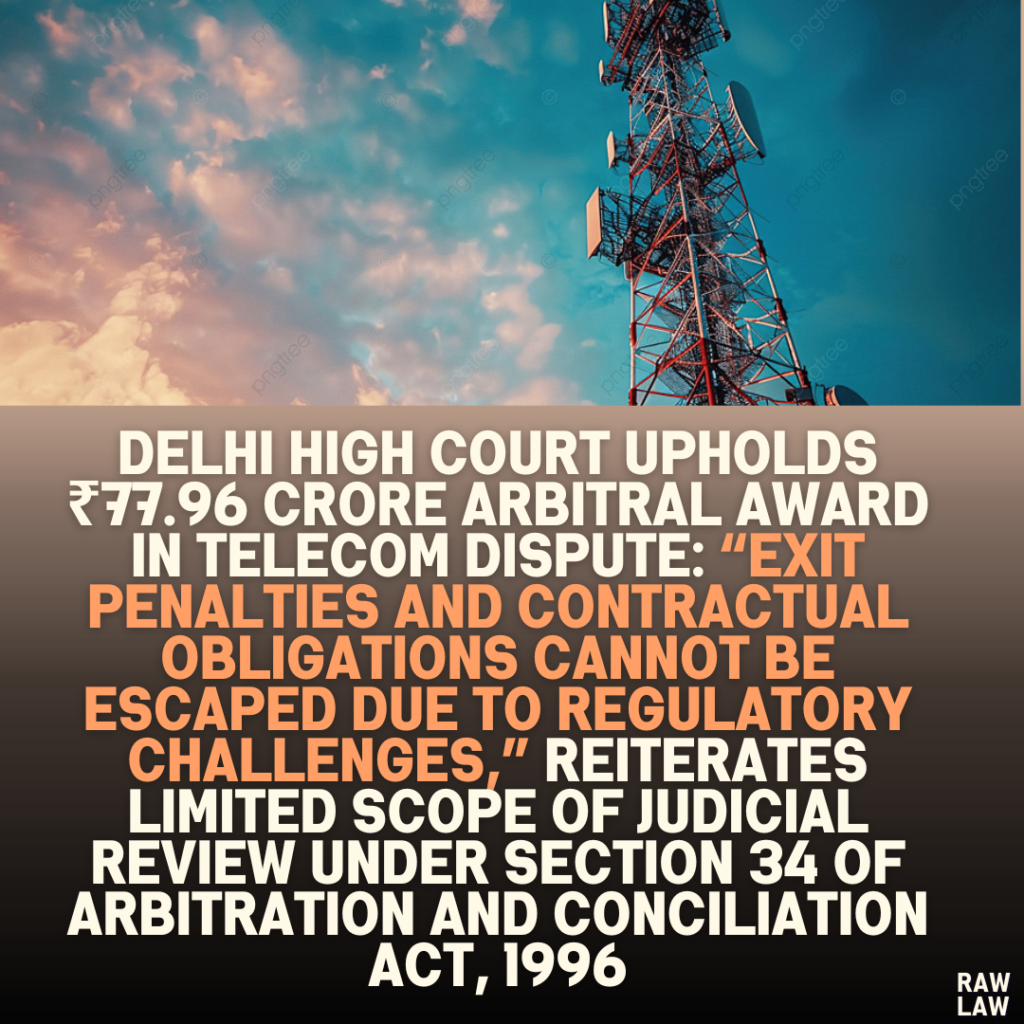Court’s Decision
The Delhi High Court dismissed the challenge against the arbitral award dated 25.05.2019, which directed the petitioner to pay ₹77.96 crore (₹19.85 crore for unpaid invoices and ₹58.11 crore as exit penalties), along with applicable interest, to ATC Telecom Infrastructure Pvt. Ltd. The Court reiterated that under Section 34 of the Arbitration and Conciliation Act, 1996, the scope for interference is limited to grounds such as patent illegality, procedural impropriety, or conflict with public policy. The Court concluded that the arbitral tribunal’s findings were reasoned, supported by evidence, and did not warrant judicial interference.
Facts
- The petitioner held a Unified Access Service License (UASL) for providing telecom services in Punjab, which was set to expire in September 2017. The petitioner had earlier converted its Basic Service Operator License into UASL in 2003.
- Regulatory refusals by the Department of Telecommunications (DoT) to extend the UASL license led the petitioner to shut down its GSM services in February 2017, well before the license expiration date.
- The disputes arose from unpaid invoices for services rendered by the respondent and exit penalties for prematurely vacating telecom sites during the lock-in period, as governed by various Master Service Agreements (MSAs) and supplementary agreements between the parties.
- The petitioner made partial payments amounting to ₹2.52 crore but argued that this was a full and final settlement. The respondent disagreed, asserting significant outstanding dues and claiming additional exit penalties for breach of the lock-in period obligations.
Issues
- Whether the disputes fell under the exclusive jurisdiction of the Telecom Disputes Settlement & Appellate Tribunal (TDSAT), rendering the arbitration invalid.
- Whether the claims for unpaid invoices and exit penalties were valid under the agreements.
- Whether the arbitral award violated public policy or suffered from patent illegality.
Petitioner’s Arguments
- Jurisdictional Challenge: The petitioner argued that disputes concerning telecom licenses and services are non-arbitrable, as they fall under the exclusive jurisdiction of TDSAT, as per the Telecom Regulatory Authority of India (TRAI) Act, 1997.
- Full and Final Settlement: The petitioner contended that it had cleared all dues with a payment of ₹2.52 crore, which was acknowledged by the respondent.
- Exit Penalties: The petitioner asserted that the premature exit was caused by DoT’s refusal to renew its license, a regulatory compulsion that should exempt it from exit penalties.
- Public Policy and Procedural Violation: The petitioner alleged that the arbitrator ignored contractual provisions exempting penalties in cases of regulatory challenges and that the award violated principles of fairness and natural justice.
Respondent’s Arguments
- Arbitrability of Disputes: The respondent contended that the disputes arose from private contractual obligations under the MSAs and supplementary agreements, making them arbitrable.
- Validity of Claims: The respondent argued that the unpaid invoices and exit penalties were valid, supported by evidence, and consistent with the terms of the agreements.
- Financial Constraints, Not Regulatory Compulsion: The respondent highlighted that the petitioner ceased operations in January 2017, despite the UASL license expiring in September 2017, due to financial unviability rather than regulatory compulsion.
- Reasoned Award: The respondent maintained that the arbitral award was detailed, well-reasoned, and based on substantial evidence.
Analysis of the Law
- Section 34 of the A&C Act: The Court underscored that Section 34 allows for limited grounds of challenge, such as patent illegality, procedural impropriety, or conflict with public policy. It prohibits revisiting factual determinations or acting as an appellate court.
- Contractual Interpretation: The Court noted that the arbitrator is the ultimate authority in interpreting contracts, as long as the interpretation is plausible and not perverse.
- Regulatory Context: The Court rejected the petitioner’s argument that the disputes were non-arbitrable, holding that the respondent’s services (telecom infrastructure provisioning) did not constitute “telecom services” under the TRAI Act.
Precedent Analysis
The Court relied on landmark judgments such as:
- ONGC v. Saw Pipes Ltd. (2003): Awards contrary to public policy, including patent illegality or fundamental legal errors, can be set aside.
- Ssangyong Engineering v. NHAI (2019): Courts should not interfere with arbitral awards unless they violate public policy or demonstrate patent illegality.
- Associate Builders v. DDA (2015): The Court highlighted that the arbitrator’s interpretation should be accepted unless it is arbitrary or grossly unjust.
Court’s Reasoning
- Arbitrability: The tribunal correctly held that the respondent’s infrastructure provisioning services did not fall within the definition of “telecom services” under the TRAI Act, making the disputes arbitrable.
- Unpaid Invoices: The tribunal found that the petitioner had not settled the invoices in full, and the payment of ₹2.52 crore was a partial settlement, as confirmed by the evidence.
- Exit Penalties: The tribunal held that the lock-in period clauses were clear and enforceable. The petitioner’s early exit was due to financial constraints, not regulatory compulsion, negating its defense.
- Reasonableness of Award: The Court found the arbitrator’s findings to be well-reasoned and consistent with contractual terms, rejecting the petitioner’s claims of procedural impropriety or public policy violation.
Conclusion
The Court upheld the arbitral award, emphasizing the limited scope of judicial intervention in arbitration. It found the tribunal’s reasoning to be plausible and supported by evidence, with no violation of public policy or procedural fairness.
Implications
This judgment reinforces the sanctity of arbitral awards and contractual obligations, particularly in the telecom and infrastructure sectors. It highlights the limited grounds for judicial interference under Section 34 of the A&C Act, encouraging parties to honor arbitration as a dispute resolution mechanism.




Pingback: Bombay High Court Upholds Eviction Decree Against Tenants for Defaulting on Rent, Unlawful Subletting, and Misusing Premises: “Eviction Becomes Inevitable When Tenants Fail Their Obligations” - Raw Law